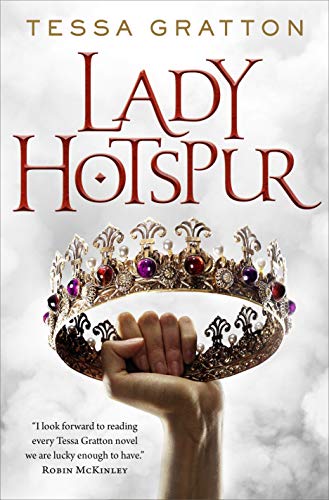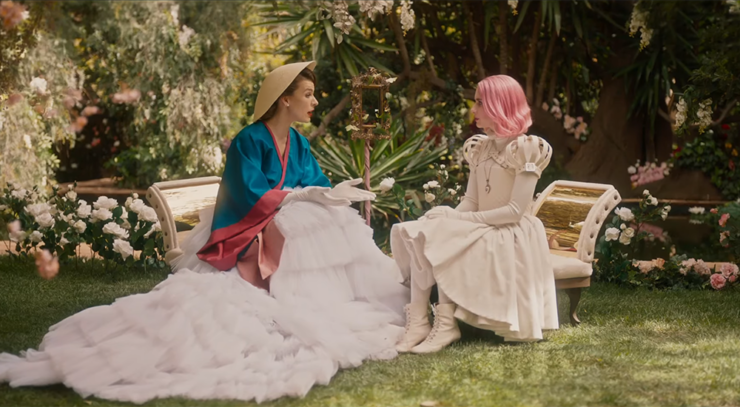Alice Waddington’s first feature film Paradise Hills (2019) begins and ends with the same scene. A golden ballroom is the setting of the palatial wedding reception for Uma (Emma Roberts) and Son (Arnaud Valois). Uma, who wears blue lipstick, a glitzy gown, and a spherical beaded net over her face, looks like a zombified citizen from the Capitol in The Hunger Games. She performs a creepy choreographed song with lyrics that liken marriage to servitude and refer to Son as her “salvation.” The faceless presence of armoured, militarized police indicate that this is no happy ceremony. In their marital chamber, Uma is pliant and dazed. “That place works miracles,” Son remarks, “you were so difficult before.”
“That place” is Paradise, an island recovery facility run by Duchess (Milla Jovovich) where—three months earlier—Uma was sent to become more amenable to Son’s marriage proposal.
Paradise’s idyllic seaside setting—all pinks, whites, and golds—is lush with flower gardens, mossy stone steps, overlapping Roman arches, and gauzy curtains that billow in a controlled breeze. This pastoral location provides the veneer for what actually functions as a privatized prison. None of Paradise’s ‘guests’ are there voluntarily, information Uma learns from her new roommates Yu (Awkwafina) and Chloe (Danielle Macdonald). Yu—whose immediate family belong to a poor class called “Lowers”—was sent to Paradise by her richer “Upper” relatives in order to develop refined manners. Chloe’s family wants her to transform into a “skinny pageant queen.” Paradise is structured around making defiant women submissive. In a clever commentary on the monetization of women’s self-care, the facility offers soothing yoga classes and morning makeovers but there’s also the torture: guests are locked onto to a carousel piece that projects them to the ceiling of a large room, where they’re forced to watch personalized brainwashing videos on a loop.
Much like the pretty but sinister pastel dystopia of Black Mirror’s “Nosedive,” the visual world of Paradise Hills has strong ties to Rococo, the 18th century French artistic movement that favoured fluffy, ornate images of aristocratic leisure. Rococo is often emblematized by paintings by Jean-Honoré Fragonard, especially The Swing which depicts a woman wearing a voluminous pink gown swaying into midair. What at first appears to be innocuous outdoor fun is complicated by shadowy area behind her where a man stands, gripping the swing’s ropes and controlling its movement. In the foreground, another man takes the opportunity to look up the swinging woman’s petticoats. Paradise Hills, like “Nosedive,” projects this Rococo aesthetic into the future, distorting its utopian images of privileged subjectivity and highlighting its confluence of power and pleasure.
Paradise Hills, a film largely interested in femininity and perfectibility, is a film that roots itself in the image to critique its current hegemony. Waddington uses the glowing art nouveau structures, uniform interiors, and oppressive shininess of 1970s genre films, citing The Abominable Dr. Phibes (1972) and Logan’s Run (1976) as major cinematic influences. Yet while Paradise may be futuristic, it functions as a microcosm of our own imagistic world. Paradise’s women are always coiffed and photo-ready; its controlled, elaborate architecture means people in it always appear arranged. Here, Waddington introduces the concept of duplicity, the kind that isn’t far off from personal curation of one’s Instagram self. An outward facing avatar can be freeing, but it can also be an oppressive reiteration of untenable normative ideals. How much real autonomy do we have in designing and presenting ourselves, and how much of this is given away to corporations? As setting, Paradise literalizes the gendered trap of perfection.
The disappearance of women’s autonomy is strongly evoked by the film’s citations of Picnic at Hanging Rock (1975), though gauzy white cotton dresses are exchanged for leathery versions that look like repurposed straightjackets. Picnic at Hanging Rock similarly envisions a lush psychedelic nightmare in which young women go missing in a sublime location. This reaches its sinister zenith when we learn that Paradise’s guests are being slipped soporific drugs on a nightly basis. This ominous orchestration to make women that turns women who would otherwise escape into compliant dolls, also introduces the threat of sexual violence into Paradise. Most of Paradise’s staff—save for its toxic matriarch—are men, meaning that Uma and her friends are always vulnerable and exposed.
Dainty glass teacups and puffy dresses compose Waddington’s mise-en-scène, but Paradise Hills builds towards a dark, labyrinthine series of twists. As the stakes mount and our perception of Paradise changes, its appearance might be described as a dollhouse animated by the Tethered in Jordan Peele’s Us (2019). Much like Peele, Waddington is interested aestheticizing class divisions through the figure of the doppelgänger or uncanny double. Whereas Us richly excavates the past; Waddington looks to the grim possibilities of futuristic technology to broaden existing inequalities. The film’s ending reveals that Paradise doesn’t operate around healing its guests, but killing these women off. They’re replaced by members of the poorest classes who live in a subterranean lab, are paid to go through physical surgeries and are behaviorally reprogrammed to eventually replace these defiant but privileged Upper women. Yu’s double delivers a monologue that informs the audience these rich protagonists who we’ve perceived—until this point—as prisoners have experienced nothing compared to the abject situation of the most desperate Lowers. Our sympathies splinter and the film’s narrative becomes more conceptually nuanced.
Buy the Book


Lady Hotspur
Paradise Hills offers no solutions to the problems it presents, instead choosing to lay them bare to the audience as a warning. In many moments, the ethical ruminations about human expendability found in Kazuo Ishiguro’s novel Never Let Me Go resurface in Paradise Hills which is similarly troubled by the speculative image of the clone. Likewise, Paradise Hills seeks to perturb rather than map a way forward. The film’s ending returns to Uma’s wedding, where she and her identical double—having escaped paradise—kill Son and swap places forever. It’s a non-solution: Uma’s double gets to live (without an abhorrent husband) in the class privilege she’s never had, meanwhile Uma—who literally slips away into the shadows—has the autonomy to go forth and self-define. Despite its visual lightness, this is a tenebrous dystopian conclusion because we’ve just been shown that nobody has the liberty to self-define within the system Paradise Hills represents.
This double bind cuts close to real feelings of life in advanced capitalism. Of course, such weightier affects always brush up against a peculiar funniness. Waddington is also invested in the underused possibilities of humor to capture these contradictions. Paradise Hills indulges decadent moments of absurdity. After all, this is a film where a grotesque patriarch is named “Son”. This ludicrousness is most frequently propelled, however, by Jovovich’s performance as the Duchess, who appears in increasingly outrageous costumes: in one scene, she plucks stems from a rose garden while donning a vaginal gown made from gigantic red petals. Later, we find out that the Duchess is a vampiric creature feasting on the blood of these women to make her young. This isn’t even the film’s main twist. Does this make any sense? No, but audiences are willing to accept Waddington’s large leaps because the campy genre bricolage of Paradise Hills is executed with generous, palpable affection.
While Paradise Hills has a lot of love for science fiction and fantasy, it is quick to critique the ways in which women are often reduced within these genres. In interviews, Waddington has mentioned that their film’s target audience is young women and girls who have been drawn to genre but have had to exercise imagination to see themselves represented within it. While the script’s focus on Uma forgoes a more robust exploration of Yu and Chloe’s characters, this is partially so that Paradise Hills can foreground a queer love story between Uma and Amarna (Eiza González): a pop superstar punitively sent to the island for wanting to control her own image and music. While Uma and Amarna chastely fall in love, Paradise Hills offers much more than a futuristic fairy tale or nostalgic wish fulfillment. Many bodies are buried before we see a glimmer of hope in the film’s conclusion, which comes at the cost of a precarious exchange between Uma and her double.
The highly contemporary themes of Paradise Hills—perfectibility, class, technology, power—facilitate an audience’s easy connection with its material. Paradise Hills may be directed at a younger audience but this is not a coddling film, because we’re shown a hopeless, entangled, unsolvable world that its protagonist must now navigate alone. The story also doesn’t provide—like some dystopian YA—an oversimplified revolutionary plot that hinges on annihilation and then cathartic rebuilding. Paradise Hills emphasizes happiness as an aggressive, impossible currency, and loneliness as a status quo. This may sound evasive or cynical, but the film’s ambiguity is far more activating because it cuts scarily close to contemporary truths. By presenting an oppressive world built on surfaces, Paradise Hills probes unexpected depths.
Katherine Connell writes about film and culture. She is a staff writer for the feminist film journal Another Gaze. Her work has also been published in BlackFlash, Canadian Art, Cineaste, Little White Lies, MUBI Notebook, New Statesman, Plenitude Magazine, Reverse Shot, and Reel Honey.










